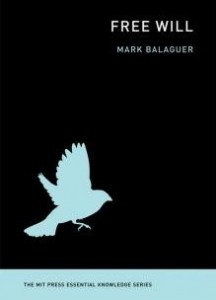
The ancient debate over free will is going through a resurgence as modern science reveals more about the human brain and how people make decisions.
Dr. Mark Balaguer has spent more than a decade thinking and writing about free will in light of neuroscience discoveries. In his latest book Free Will, Balaguer takes a look at the current literature, both academic and mainstream. He concludes that the popular belief about free will—that neuroscience evidence proves it does not exist—is too hasty.
Balaguer is a California State University, Los Angeles professor and the author of two previous books (including another on free will), as well as numerous academic papers. He spends a good portion of Free Will disputing neuroscientist/philosopher Sam Harris’s arguments as laid out in his most recent book, (also titled Free Will (2012)). Harris cites modern experiments in neurophysiology as well as close examinations of traditional philosophical stances on free will to argue that it is an illusion. One critic said Harris’ book “lay[s] this illusion [of free will] to rest at last.”
It must be noted that Harris does not advance a new argument. Many less commercial modern thinkers, such as Richard Dawkins, Cordelia Fine, Oliver Sacks, Michael Gazzaniga and Daniel Wegner, have also contended that free will doesn’t exist. He does, however, use plain language to describe his theories, which helps him to reach a wide audience. Nonetheless, by the time Balaguer finished reading the New York Times best-seller, he remained unconvinced.
“I said, ‘This is a bunch of baloney. I can do better than that.’ That was what moved me to [write my book], was seeing the Harris book for a general audience.”
Balaguer’s Free Will is the widely accessible version of the claims in his previous book, Free Will as an Open Scientific Problem (2009). Aside from translating his arguments into layman’s terms, Balaguer adds responses to neuroscience studies Harris does not reference. He also examines several of the same studies, as well as broader philosophical arguments, that Harris does. But he arrives at a different and, he says, more nuanced conclusion.
“The final conclusion is not that we do or do not have free will, but that it’s an open question for future neuroscience. We’re trying to use these primitive studies to know something that is [to be determined] way down the road.” In other words, it’s too early to label free will an illusion just yet.
Take the much-cited electroencephalography (EEG) experiment conducted by the physiologist Benjamin Libet in the early 1980s, a study Harris relies on in his book. Libet asked test subjects to decide at some point during the experiment to move their hand, and immediately note the moment they made the decision on a clock. The EEG detected neural activity in the brain approximately half a second before subjects made a conscious decision about when to move their hand. Libet’s conclusion was that this neural activity proves the brain makes a decision before a person becomes aware of it.
The problem with this conclusion, Balaguer says, is that it’s not clear whether the neural activity detected in the Libet study is actually associated with decision-making, or with something else entirely.
 “Where I would agree with these people is that the decision is a neural thing. But the problem is, we don’t know which neural event is the decision— there’s all sorts of neural activity happening, the brain is constantly buzzing—because we’re sort of in the infancy of neuroscience,” Balaguer says. “The evidence that people are citing for this is actually not good evidence, so there is no reason from science or philosophy to think that we don’t have free will.”
“Where I would agree with these people is that the decision is a neural thing. But the problem is, we don’t know which neural event is the decision— there’s all sorts of neural activity happening, the brain is constantly buzzing—because we’re sort of in the infancy of neuroscience,” Balaguer says. “The evidence that people are citing for this is actually not good evidence, so there is no reason from science or philosophy to think that we don’t have free will.”
Balaguer calls on scientists to learn what neural events comprise a decision, and then figure out what causes those events, and ultimately, a person’s end decision. It is possible, he says, that once those discoveries are made, free will could be found not to exist.
“We’ve made tons of progress in neuroscience in the last couple of decades,” he says. “We used to know nothing. Now we are way better than we were. But…this could be 200 years down the road. This is finding in the brain the neural event that is the decision.”
“They are on the right track on it,” he says. “But it’s way too early to make a call on free will.”

